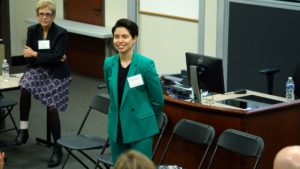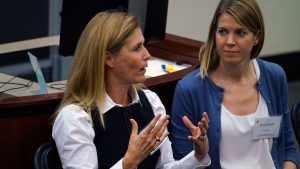News & Stories
Where are all the female mentors?
 The Carolina Women in Business Conference brings women together to discuss common issues found in the workplace. During its 2017 workshop on entrepreneurship, panelists discovered that none of them have a female mentor.
The Carolina Women in Business Conference brings women together to discuss common issues found in the workplace. During its 2017 workshop on entrepreneurship, panelists discovered that none of them have a female mentor.
During the “Deconstructing the Pitch” workshop, Braden Rawls, cofounder and CEO of herbal supplement service Vital Plan, and Nicole Corbett, founder and CEO of the mission-based creative agency Worn, took turns pitching their respective businesses and receiving feedback from investors Jan Davis (MBA ’79), an entrepreneur-in-residence at UNC and an investor in Triangle Angel Partners, and Susan Greene, president of SPG Associates, specialists in non-profit consulting.
The topic of mentors came up during the feedback portion of Corbett’s pitch. When Greene asked Corbett about her female mentor, she replied that she doesn’t have one – even though she mentors five women – and that all of her mentors are men.
Corbett said it’s hard to find a female mentor who can take you where you want to go. Greene and Rawls acknowledged that they are in similar situations as neither has a female mentor.
The difficulty of finding a female mentor is a problem that’s not unique to these three women. Corbett has spoken to women executives at Spotify who don’t have female mentors, and no matter what a stage a woman’s career is in they need to have someone they can talk to who understands their specific challenges.
 So how do Rawls and Corbett fill the gap? Corbett is in the early stages of building a female board of advisors for Worn. With the diverse expertise of a board, Corbett hopes they will fill in any holes in her company and her knowledge.
So how do Rawls and Corbett fill the gap? Corbett is in the early stages of building a female board of advisors for Worn. With the diverse expertise of a board, Corbett hopes they will fill in any holes in her company and her knowledge.
Rawls has taken a slightly different approach. She joined two programs in the Triangle designed to support female entrepreneurs: NC Idea Soar, a competitive program that helps women entrepreneurs raise capital and navigate common obstacles, and e51, which supports women entrepreneurs in a broader scope though networking and training events.
Rawls and Corbett may not have female mentors, but they have found good alternatives. As more and more women enter male dominated fields, the need for mentors will only increase, so finding a strong female support system, if not a mentor, is important. The good news is that this influx of women in business, specifically in entrepreneurship, means that future generations of female entrepreneurs will have plenty of female mentors from which to choose.
By Kelly McNeil (BSBA ’19)